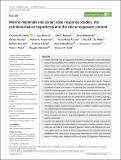Marine mammals and sonar : dose-response studies, the risk-disturbance hypothesis and the role of exposure context
Abstract
1. Marine mammals may be negatively affected by anthropogenic noise. Behavioural response studies (BRSs) aim to establish a relationship between the exposure dose of a stressor and associated behavioural responses of animals. A recent series of BRSs have focused on the effects of naval sonar on cetaceans. Here we review the current state of understanding of the impact of sonar on marine mammals and highlight knowledge gaps and future research priorities. 2. Many marine mammal species exhibit responses to naval sonar. However, responses are highly variable between and within individuals, species and populations, highlighting the importance of context in modulating dose-response relationships. 3. There is increasing support for the risk-disturbance hypothesis as an underlying response mechanism. This hypothesis proposes that sonar sounds may be perceived by animals as a threat, evoking an evolved anti-predator response. An understanding of responses within both the dose-response and risk-disturbance frameworks may enhance our ability to predict responsiveness for unstudied species and populations. 4. Many observed behavioural responses are energetically costly, but the way in which these responses may lead to long-term individual and population level impacts is poorly understood. Synthesis and Applications Behavioural response studies have greatly enhanced our understanding of the potential effects of navy sonar on marine mammals. Despite data gaps, we believe a dose-response approach within a risk-disturbance framework will enhance our ability to predict responsiveness for unstudied species and populations. We advocate for (1) regulatory frameworks to utilise recent peer-reviewed research findings when making predictions of impact (where feasible within assessment cycles), (2) regulatory frameworks to account for the inherent uncertainty in predictions of impact, and (3) investment in monitoring programmes that are both directed by recent research and offer opportunities for validation of predictions at the individual and population level.
Citation
Harris , C M , Thomas , L , Falcone , E , Hildebrand , J , Houser , D , Kvadsheim , P , Lam , F-P A , Miller , P , Moretti , D J , Read , A , Slabbekoorn , H , Southall , B L , Tyack , P L , Wartzok , D & Janik , V M 2018 , ' Marine mammals and sonar : dose-response studies, the risk-disturbance hypothesis and the role of exposure context ' , Journal of Applied Ecology , vol. 55 , no. 1 , pp. 396-404 . https://doi.org/10.1111/1365-2664.12955
Publication
Journal of Applied Ecology
Status
Peer reviewed
ISSN
0021-8901Type
Journal item
Description
This manuscript was written following the Behavioral Response Research Evaluation Workshop (BRREW), jointly sponsored by the US Office of Naval Research, US Navy Living Marine Resources, and US National Oceanic and Atmospheric Administration - National Marine Fisheries Service. PLT acknowledges funding from the MASTS pooling initiative (The Marine Alliance for Science and Technology for Scotland). MASTS is funded by the Scottish Funding Council (grant reference HR09011) and contributing institutions.Collections
Items in the St Andrews Research Repository are protected by copyright, with all rights reserved, unless otherwise indicated.

